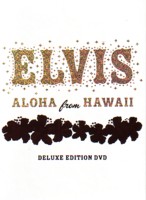Mac Davis Interview
Writer of 'In The Ghetto' & 'A Little Less Conversation' talks in depth with author Ken Sharp
|
Mac Davis was one of Elvis Presley’s most-important songwriters.
He wrote several million-sellers for Elvis including the politically significant number one ‘In The Ghetto’, 'Don't Cry Daddy' - as well as the song that restarted Elvis’ new renaissance, ‘A Little Less Conversation.’
Ken Sharp author of ‘Writing For The King’ spent a while talking with Mac Davis who revealed not only his inspiration for writing these incredible songs but also the delight he had in spending time with Elvis.
Mac Davis talked about his relationship with The Colonel, his surprising inspiration behind ‘Don’t Cry Daddy’, going to Elvis’ Bel Air house, how Elvis wanted to appear on Rowan & Martin’s ‘Laugh-In’ TV show, seeing Elvis in Vegas and much, much more.
|
 |
29/09/2020 - Mac Davis Dead aged 78: In truly tragic news Mac Davis died Tuesday night following heart surgery. He was 78.
Mac Davis’ longtime manager Jim Morey announced his death, “Mac Davis has been my client for over 40 years, and, more importantly, my best friend. He was a music legend, but his most important work was that as a loving husband, father, grandfather and friend.
I will miss laughing about our misadventures on the road and his insightful sense of humor."
In addition to Elvis other artists who recorded his compositions were Kenny Rogers, Dolly Parton, Glen Campbell, Tom Jones and Johnny Cash. But the Grammy nominee saved some of his best work for himself, scoring hits with the Grammy-nominated “Baby Don’t Get Hooked on Me,” which he took to No. 1 in 1972, as well as “Stop and Smell the Roses” and “It's Hard To Be Humble." His success, and general affability and charisma, led to his own NBC variety series in 1974, the same year the Academy of Country Music named him entertainer of the year.
Born Morris Mac Davis on Jan. 21, 1942 in Lubbock, Texas, Davis was a member of the Songwriters Hall of Fame and the Nashville Songwriters Hall of Fame. After |
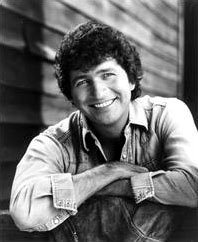 |
relocating to Los Angeles he became a staff writer for Nancy Sinatra's publishing company. He began to get cuts for a number of artists, including "Watching Scotty Grow" for Bobby Goldsboro and "Something's Burning'" for Kenny Rogers & The First Edition, as well as a spate of ELVIS records, including 'A Little Less Conversation,' 'Memories,' 'Don't Cry Daddy,' and 'In The Ghetto' which Presley took to No. 3 on the Hot 100 chart. The song has been recorded by more than 170 artists, including Parton, whose version reached No. 50 on Hot Country Songs.
Davis noted that, "'Memories' was the first real hit I had. I wrote for Elvis' comeback special. They had asked for a song about looking back over the years, and oddly enough, I had to write it in one night. I stayed up all night at Billy Strange's house in Los Angeles. He had a little office set up in his garage. I wrote it right there."
Whether penning songs for himself or others, Davis seemed effortlessly able to write music addressing any topic from the racial inequity "In the Ghetto", pitfalls of fame in the humorous "It's Hard to Be Humble", to confessional "Texas In My Rearview Mirror." His lyrics were often as poignant as they were tongue-in-cheek, but always right on point.
|
 |
Davis's musical and TV success catapulted him to movies, including 1979's North Dallas Forty with Nick Nolte, 1981's Cheaper to Keep Her and The Sting II with Jackie Gleason in 1983.
He also starred on Broadway in The Will Rogers Follies, and guested on numerous TV shows, including Murder She Wrote, The Muppets, Webster, King of The Hill and Fargo.
His last acting appearance was as a preacher on Parton's 2019 Heartstrings series on Netflix.
Reba McEntire said, "Thank you, dear Lord Jesus, for letting us know the man to whom you gave the most incredible talent. He entertained and spread joy to so many people. What a wonderful legacy he left all of us with his music. Mac was one of a kind."
Davis is survived by his wife of 38 years, Lise, and sons Scott, Noah and Cody, along with a number of other relatives, including his mother, Edith.
He will be buried in Lubbock, befittingly, given the memorable line from "Texas in My Rearview Mirror"- "And when I die, you can bury me in Lubbock, Texas in my jeans." |
Before Ken Sharp's fascinating interview with Mac Davis we wanted to ask him a few questions ourselves about meeting these important composers.
EIN - Ken, what was it like to meet these great songwriters?
Ken Sharp - For me, it's the music that matters and having the opportunity to sit down and converse with many of the songwriters who helped Elvis's music come alive was a thrill. Hearing their stories about the creation of the songs that Elvis recorded opened up a heretofore unknown window into Elvis, the creative artist. Also, getting a chance to speak with Freddy Bienstock, Elvis's publishing liaison with Hill & Range was very facsinating. He rarely gives interviews so the chance to speak with him at length was wonderful and revelatory. After he received the book, I was quite surprised to receive a lovely letter from him which says:
"Ken Sharp had a terrific idea for a 'different' Elvis book and the final result is most impressive and entertaining. And let me say it is also a pleasure to be quote so accurately in what should become among the more important Presley books of the decade."
EIN - Who did you find the most fascinating to chat to?
K.S - That's a difficult questions and would be like picking out your favorite child. All the interviews are important for their own reasons. If I had to select a few I'd go with Leiber and Stoller, Don Robertson, Dennis Linde, W. Earl Brown, Mark James, Mac Davis, Jerry Reed, Randy Starr, Florence Kaye, and so many others.
EIN - Who surprised you most with their answers?
K.S - That's also another tough question, Piers. I think all the interviews have their own interesting and compelling golden nugget or two of info about the creation of a song recorded by Elvis. I enjoyed speaking with Randy Starr who pulled no punches discussing his work writing songs recorded by Elvis for his movies. He's a very intelligent and articulate man and gave some informative answers when defending the movie songs , which in his opinion, have received a bad rap over the years. He explains that the songwriters were writing songs specifically for the films, to fit a scene or musical motif. In accordance with the wishes of the movie studio/Hill & Range that's what they did. If the fans want to cast any blame, it should be directed towards the movie studios who were dictating the sound, scope and direction of the material. That said, I'm also of the opinion that the movie songs get a bad rap. There's quite a few of them that I particularly love--almost everything from "Viva Las Vegas" and "Kid Galahad" for starters.
EIN - I have always wanted to talk with Red West about his musical relationship with Elvis - did you feel there was something special there with Red, and do you feel he is unjustly abused for his involvement in the book 'Elvis What happened?"
K.S - Regardless of his involvement with the "Elvis-What Happened" book I believe Red had a special connection with Elvis, both on a personal and musical level. Throughout their years together, whether singing as a trio with Elvis and Charlie Hodge or contributing songs that Elvis recorded or even co-wrote, in my opinion Red really understood the essence of Elvis as an artist and man. Listen to "Separate Ways" if you need any further convincing.
EIN - I find it pretty emotional reading Dennis Linde's interview knowing that he died so recently (December 2006). When did you talk to Dennis?
K.S - I interviewed Dennis about a year back and found him to be one of the most down to earth and humble people you'd ever want to speak with. I felt privileged to get to know the man, not only was he a tremendous songwriter but one of the kindest people I've ever interviewed.
There's an interesting sidenote...It took some time for Dennis to find the 1/4" reel with his demo of "Burning Love" and later to locate someone in Tennessee who could transfer it on an older tape machine. I remember getting the excited call from Dennis that the tape was finally transferred. He hadn't heard the song for a while and was quite pleased with his demo, which I think is great. He also found the original handwritten lyrics for "Burning Love" in the box that he kindly allowed us to reprint in the book.
EIN - Do you know if Dennis ever got to see the Elvis On Tour 'Burning Love' rehearsals that have recently come out on bootleg DVD?
K.S - Well, Dennis was a very quiet guy but I remember that was a time when I got him very excited. I called him one day and told him there was an underground DVD featuring previously unseen footage of Elvis singing "Burning Love" in the recording studio culled from the "Elvis On Tour" film. I got a copy from a friend and promptly sent it on to Dennis. Soon thereafter Dennis called me, filled with joy, at this unexpected gift from the heavens.
With Dennis now sadly gone, I feel honored to have spent some treasured moments with this gentle and talented man.
EIN - Mac Davis wrote some of Elvis most important songs - perhaps his most important for the new Elvis renaissance in 'ALLC' . What was he like to talk to?
K.S - Mac is one of my favorite songwriters and he was a pleasure to speak with; he had some great stories to tell including one about playing "Don't Cry Daddy" to Elvis for the very first time and how the room went silent after he was done because Elvis was very moved by the song. While some criticize the song for being too melodramatic and sappy, I disagree. The lyrics, specifically, "today I stumbled from my bed with thunder crashing in my head, my pillow still wet from last night's tears" and "why are children always first to feel the pain and hurt the worst, it's true but somehow, it just don't seem right" gets me every time. "Don't Cry Daddy" was the first Elvis single I ever bought and it holds deep personal significance to me because of my parents' divorce at the time. So for that song alone plus "In The Ghetto", "A Little Less Conversation" and "Clean Up Your Own Backyard," Mac remains one of my favorite songwriters. Truth be told, I even like "Charro"!
Ken Sharp interview by EIN Vice-President Piers Beagley.
EIN thanks Ken Sharp for letting us publish his interview with Mac Davis.
Note - It has been slightly edited for space.
You can find this full interview along with another 141 detailed conversations about Elvis and his musical creativity in the FTD book ‘Writing For The King.’
Mac Davis
- as interviewed by Ken Sharp.
Writer of - Clean Up Your Own Backyard; Charro; Don't Cry Daddy; In The Ghetto; Memories; Nothingville.
|
 |
Mac Davis - I had a big hit with a song of mine called "Hooked On Music," which talks about the first time I heard Elvis on the radio. It was a number one Country record. Back when I was growing up in the Fifties, a friend of mine, a kid named Billy Akins, and I were out way beyond curfew on New Year's Eve. It was three or four o'clock in the morning and they played "That's All Right, Mama" on the radio. In those days you could go down to the record store and go into a little booth, sort of like a bank of phones, and they had little 45 record players in there. You could get a single, take it over, put in on and listen to it and see if you wanted to buy it or not. I remember very distinctly the next day, me and Billy, going around to a record store and trying to find a record by this guy named 'Almon Parsley' (sic). That was exactly the way I heard his name. I'd never heard the name Elvis but I find now that it was a more common name than I'd thought. We just had barely heard the tail end of the song and the DJ was saying, "That's the new one by Elvis Presley." I was saying, "What was that name again?" It was real late at night. Me and Billy were all over the place trying to find that record. Today, it's hard to fathom that anybody has not heard the name Elvis Presley. Anybody. Whether it's a six-year old kid or whatever, they seem to be able to say Elvis and wiggle their legs. (laughs) I've written about it in other songs too like "Texas In My Rearview Mirror." All those things really happened to me.
I wrote "A Little Less Conversation" with Aretha Franklin in mind. When I saw the script for Live A Little, Love A Little, which looked pretty much like all of Elvis' scripts -"Elvis gets in a fight," "Elvis sings," "Elvis gets the girl." And then that repeats. (laughs) Every time you'd see the words, "Elvis sings," that's where a song would go. I was thrilled to get a chance to have a song in an Elvis movie. I think I felt the same way that Elvis felt in those days. His music was just getting kind of stale. It was the same old stuff. I think he was ready to try something a little different and a little funkier.
The fact that Billy (Strange) brought the script in and gave me a shot at it was wonderful. I had this song and the title fit perfectly for the scene around the swimming pool. I played it for Billy and asked him if Elvis would like it and if he thought it would fit in that section. He said, "Yeah, but we're gonna have to change the words." So I changed the lyrics around and basically that's where the song came from. |
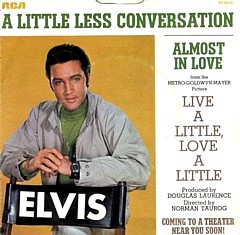 |
33, 34 years later "A Little Less Conversation" has been rediscovered by a new generation. I'm shocked, to be honest with you, by its newfound success. I think the song got as high as 68 or 69 in the charts when it was released the first time in the late 60's. In all honesty "A Little Less Conversation" was not my favorite recording of Elvis'. I kind of thought it was sluffed off because it was done for a movie. I didn't think Elvis really got into it the way he could have. But I was wrong. (laughs) Years and years later I heard the original version when I saw the remake of Ocean's Eleven. In fact, nobody had told me it was in the movie. It was a total shock. I was watching it with my wife and went, "Oh my God, I wrote that!" And she said, "Wow!"
The original version of "A Little Less Conversation" that I wrote for Aretha was, (recites lyrics) "I worked hard all day long to please you and treat you like a king. And you come home just runnin' your mouth and baby you ain’t seen a doggone thing. A little less conversation, a little more action please." And it was way slower than Elvis did it and way funkier.
I was doubly shocked when the remix of "A Little Less Conversation" came out. I didn't know it had been done. A month or so later, a friend of mine, Billy Tomberland, who's a songwriter, called me up and congratulated me on my hit. And I said, "What hit?" He said, "Well, you've got the number one record in England with "A Little Less Conversation." And I said, "What?" Once again I didn't know. He had been on his computer and he's one of these guys who keeps up with stuff like that. He's the one that told me that they had done a commercial using "A Little Less Conversation" and Nike had picked up on it and decided to sweeten it and remix it. I knew none of this. Finally I mentioned something about it to my boys and they both jumped up and down. They said, "Wait a minute, are you talking about the song in the commercial?" And I said, "Yeah," They said, "God, well, all the kids in school are singing that. You wrote that Dad?" They were totally impressed. I had never impressed them with anything before that. (laughs)
I loved the remix of "A Little Less Conversation," I absolutely loved it. I thought, well, this is the damnedest thing I'd ever seen! I was just totally shocked. I was thrilled (laughs) but I would still rather have heard Elvis sing the song with the original lyrics I wrote, even if he had just changed it from "I'll treat you like a kink" to "I'll treat you like a queen." I would have loved to have heard Elvis go (sings), "I worked hard all day long to please you, treat you like a queen. When I come home you keep a runnin' your mouth and baby you ain't sayin' a doggone thing. Now give me a little less conversation, a little more action please." That would have been great with Elvis doing it that way. As it was, I had to change it for the Colonel and the movie people. It was changed to, (sings) "it's a groovy night and I can show you how to use it." That really wasn't the way I talked. But it worked and the chorus is the hook anyway, (sings) "a little less conversation, a little more action please."
The first time that I met Elvis was when I went over to the Live A Little, Love A Little filming where Elvis sang the song to the girl around the swimming pool. I felt humbled in the presence of the great one. I was a teenager and he was my idol as a kid. I was a Fifties child. He and James Dean were my heroes. The first time I saw Elvis play live was in the Fifties in the parking lot of the Hub Motor Company in Lubbock, Texas. Elvis was standing on the back of a flatbed truck performing. Then he came back a year later and he filled up the Lubbock County Fairgrounds and I saw him at that show too.
Anyhow, so I got invited to the soundstage where Elvis was lip synching "A Little Less Conversation" for the movie. In those days everything had to be done in slow motion. If Elvis messed up and missed a lyric or the director said, "We want to take that again," it took the full length of the recording backwards while they were rewinding. So if Elvis was two minutes into the song and he messed up, it took another two minutes to rewind it and start over again. When there was a mistake, Elvis would stop and go to the piano. It was an all night affair. It just went on and on and on. At that time the Colonel was sitting there next to the stage in an old theater seat and the Memphis Mafia guys had put a stool out there to put his feet up on. He had a big cigar in his mouth and he called me over to him. He said, (imitates Colonel's brusque manner of speaking) "Are you the boy who wrote this song?" And I said, "Yes Sir." He said, (imitates the Colonel) "Come here a minute." I went over to him and he said, (imitates the Colonel) "Let me rub that curly head of yours." I said, "What?!" And the Memphis Mafia boys were nodding like if he wants to do it let him do it. So I kind of bent over and he reached up and rubbed my head and went, (imitates the Colonel) "All right boy; you tell everybody that the Colonel rubbed your head, you're gonna be a star." (laughs)
Moving ahead to 1980 and I'm opening at the Hilton Hotel in Las Vegas and the Colonel came in for opening night. They said it was the first time he had been there since Elvis had passed away. He came in and brought me a great big old picture of Elvis that he had taken off his office wall or something. (laughs) It was a copy of a huge velvet painting of Elvis that was on plywood, and he had signed it in huge letters. He told me. "This is my favorite painting of Elvis." But, of course, it wasn't the original, it was just a copy. He signed it. "To Mac Davis, whose curly head I once rubbed and told he was gonna be a star." And it was signed "the Colonel." He signed it right across the picture. That was the Colonel.
There's not much to say about "Clean Up Your Own Backyard." It was just a song that I wrote. I had written the song entirely and had the title. I'm still fuzzy how Elvis got that one and used it for The Trouble With Girls.
"Memories" was my first top ten record. It was the first big one that I had. It was written specifically for Elvis and the TV special. Billy (Strange) and the director, Steve Binder, said "We want to bookend this section where he's looking back over the years of rock and roll. " They said that they wanted to bookend him singing his old hits of the Fifties and wanted a song about looking back over the years.
I sat down in Billy Strange's garage and spent the whole night writing that song. I wrote it on guitar. We had to do this so quick. We only had a 24 hour window to get it down, get a demo on it and get it to Elvis. They were moving real fast. I couldn't wait to sing it to Billy the next morning. I stayed up all night out there in his garage and the next morning when he got up I sang it to him. If I'm not mistaken, it was either that same day or the next day we did a little demo of it and they took it to Elvis and he decided to use it. |
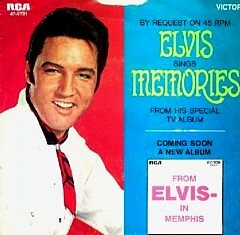 |
I think they gave me the title, "Nothingville" and asked if I could write something about this little nowhere place, this little town that they wanted to make believe Elvis came out of. I remember thinking I had come up with an awful good rhyme in the middle of it, (recites lyrics), "it's a rat race run at snail's pace." I thought that was one of my more clever little lines.
It was put to me that Elvis wanted to record some new stuff. He was inspired after the success of "Memories" and the TV show and all that. They wanted to see if I had anything for him. I went into the studio and cut a tape of every song I had that hadn't been recorded, just guitar and vocals. It had 19 songs on there. "In The Ghetto" was on that tape, "Don't Cry Daddy." One song they recorded but never got a vocal on was a thing called "Poor Man's Gold." I know they were cutting tracks, and I've actually heard little bits and pieces of it. Elvis did sing a little bit of it but the takes are all lost as far as I know. "Poor Man's Gold" was a ballad. (recites lyrics) "It's the feeling I get looking down at my brand new baby. Holding on to daddy's thumb just as tightly as he can hold. And it's knowing he looks a lot like his mother, these things are a poor man's gold." I recorded it on one of my albums. Two of the songs on that tape became hits for Elvis, "Don't Cry Daddy" and "In The Ghetto."
I wrote a lot of sad songs. I think all songwriters do but not all of them become hits. But a lot of mine did. I had a song called "Watching Scotty Grow" that I wrote for Bobby Goldsboro. At the time I was going through a divorce. I had my son, Scotty for the weekend and was about to take him home. I had some time to kill and I flipped on the five o'clock news. Scotty was about five or six years old. It just happened to be the broadcast where they were showing some film of the massacre in Vietnam. It was a very famous horrific incident where some of our guys shot to death some women and children villagers. They were showing some scenes of the bodies and apparently I started crying and didn't even realize it. The next thing I know Scotty was patting my back and going, "Don't cry daddy." That's where the inspiration came from for "Don't Cry Daddy." My songwriter's brain made it totally different. By the time I got Scotty home to his mother's and on the way back to my house I had the chorus written. Basically that's where the song came from. It was a combination of him telling me not to cry because of watching this massacre in Vietnam on TV and my own situation having gone through a divorce.
I didn't know at the time that it was a special song. It was just another day in the life of a songwriter. We write songs about our lives and about things that happen to us. We change them around. We hear something that's interesting to us, a title or something and we change it around to fit so more people will be interested in it. You don't want to have everything be about you as a songwriter. You want people to hear it so you write things that will appeal to everybody. You pour your feelings into something and you change it around and try to make it about life. You have to alter it a little bit because unfortunately life doesn't rhyme.
I went over to Elvis' house in Bel Air. I was really full of myself because I was at Elvis' house. (laughs) I mean that was a big deal to me. To be in Elvis' house and all of the smoked mirrors and the black and red flocked wall paper, that was it, man. I remember holding Lisa Marie and she was just an infant, just three or four weeks old. Elvis had Priscilla bring her in just for a second and let me hold her. I later saw her on a plane trip once when she was about nine or ten.
I played "Don't Cry Daddy" live right there for Elvis. This was before I put the tape together for Chips Moman of my songs. I went over to Elvis' house and played him a bunch of stuff. But it got real quiet in there when I sang "Don't Cry Daddy." Elvis loved it and said, "I'm gonna record that for my daddy." He wanted to record it for his daddy relating it to his mother's passing. That's the way I read it. |
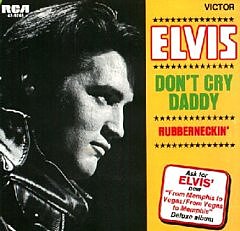 |
I loved Elvis' version of "Don't Cry Daddy." I thought it was really poignant and really sweet. It was just the way I heard it. Kind of the way that I played guitar on the demo is the way they recorded it. I do remember thinking that I should have written another verse for it. But that was me. That'll be on my tombstone, "I was still working on that last verse."
I only saw him a couple of times onstage in Vegas. I didn't go to a lot of the shows. I was invited to the big night in Vegas. It was just a huge thrill to me. He did "In The Ghetto" and he winked at me and said "Hi Mac." I forget what he said, maybe something like "here's my first number one in quite a while." The music started up and he just kinda’ winked at me. I wanted to jump up and down and say "That's me!" but I didn't. (laughs)
My daddy was a small building contractor. There was a guy named Alan Smith that had worked for him for years and years. He was just like part of the family. He was a black man and his little boy, Smitty Junior, was my age and he and I used to play together. Our daddy's would be working and in the summertime Smitty would hang out with me. They lived in a really funky dirt street ghetto. Today's term would be a ghetto. The term 'ghetto' had started to become popular to describe the urban slums. The word was used during the Holocaust to describe those situations but they hadn't used it in an American context until the late Sixties. Smitty Junior lived in a part of Lubbock called Queen City. They had dirt streets and broken glass everywhere. I couldn't understand how these kids could run around barefoot on all that broken glass, I was wondering why they had to live that way and I lived another way. Even though we weren't wealthy or anything it was a whole big step up from the way that Smitty Junior had to live.
A friend of mine, Freddy Weller, showed me a lick on the guitar. For some reason or another I had to learn it (imitates guitar lick). I was messing around with it after he left and I just went (sings) "In the ghetto." I thought, man, that just fits. I had always wanted to write a song called "The Vicious Circle." There's nothing that rhymes with circle, if you wanna know the truth about it.
A child is born in a situation, his father leaves and he ends up acting out and becoming his father. Being born and dying and being replaced by another child in the same situation is basically what I was talking about. Dying is a metaphor for being born into failure. Being born into a situation where you have no hope. If you listen to the song it's more poignant now than it was then. Instead of getting better it's gotten worse. Back then we had gangs and violence in a few cities, now we have it in almost every American city. |
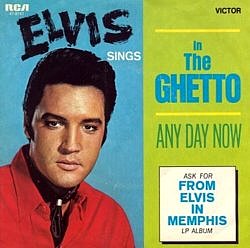 |
I called Freddy Weller in the middle of the night and played it for him. I did that with a lot with people. Everybody who was a friend of mine in those days can tell you that they got woken up a lot because I would call and sing them some miserable, sad sumbitch that I had written. (laughs) I'd have them crying and I'd feel good because I knew that I had written a good song. I'd throw my misery off on somebody else and I'd feel good. (laughs) When I had finished the last line in "In The Ghetto," I knew that I had written a hit. I didn't know that it was important but I just knew that it was a hit if the right person cut it.
I think Elvis took a huge chance in doing "In The Ghetto." It was a big risk. When they released it I was totally surprised that he saw fit to put that out as a single. That was not his image at all. He was always middle of the road when it came to controversy. The Colonel was on top of all of that stuff.
One of the things Elvis told me the first night I went over to his house was, "You know what I would like to do more than anything in the world?" And said, "What?" He said, "I wanna be on Laugh-In." I said, "You're kidding me? You wanna be on Laugh-In?"" He said, "Yeah. I wanna put on that little yellow raincoat and get on a tricycle and ride around in a circle and come up to the camera, raise my head up and go, "Sock it to me!" He said, "Don't you think that would be great?" I said, "It would probably be on the front page of the newspapers the next morning. Why don't you do it?" He said, "Colonel won't let me." I said, "Why?" He said, "Well, the Colonel just won't let me do it. It's not good for my career." I was shocked that the Colonel allowed him to put out "In The Ghetto" because it was controversial at the time. But I'm glad he did.
Elvis improved on "In The Ghetto." In fact, it was Elvis' idea to add another "and his mama cries" at the end of that song. I didn't write that in there originally. The song originally finished (sings) "And another little baby child is born ...in the ghetto." That was the end of it. Elvis threw in (sings) "and his mama cries." To me the circle had been done but he just emphasized it by saying "and his mama cries" again. I think he definitely improved it by doing that. It would have been a hit without him doing it but I still think he improved it.
All of a sudden I had my first number one record with "In The Ghetto." I was able to change my name back to Mac Davis instead of Scott Davis, which I wrote under for a while because Hal David's brother's name was Mack David. Some of my songs were coming out with his name on it because people thought it was just a typographical error. Mack David was a well known songwriter but I didn't know that at the beginning. A couple of things came out and they had his name on it as the writer so I wrote some things under my son's name, Scott Davis. Then I wrote under Scott (Mac) Davis when I got a little better known. All of a sudden when "In The Ghetto" came out it was Mac Davis again. As a matter of fact, "A Little Less Conversation" was under Scott Davis originally. The success of "In The Ghetto" opened doors to me as an artist too. Sandy Gallin took me over to Clive Davis’ bungalow at the Beverly Hills Hotel. Clive was president of Columbia Records. I did the same thing. I played a few songs for him like I did around the swimming pool and they signed me. One thing led to another and it was all because of "In The Ghetto" becoming a big hit. Elvis really opened all the doors for me. I give him all the credit, him, and Johnny Carson, Sandy Gallin and Billy Strange for introducing me to Elvis.
I can hardly remember "Charro" all I could remember was (recites lyrics) "you see behind the eyes of other men. (laughs) This is a true story. It had always been one of my dreams to hear a total stranger whistling a song that I had written-humming it or singing it or whatever. "Memories" was a hit already. I was at the Palomino club, which was a funky cowboy club out in the Valley. It's no longer around. I loved it. I was big buddies with "Big Tiny" who was the doorman. He got shot through the heart with an arrow once and lived-six-foot nine, weighed about 400 pounds. So anyway I was back in the bathroom and I hear this guy whistling "Charro." Not "Memories" but "Charro." (whistles the melody of "Charro") I go, "What's that song you're whistling man?" And he said, (gruffly) "I don't know, something that Elvis did..."Charro" or "Cheerio" or something like that." (Laughing) I walked out and went, there goes that dream. (laughs)
Nobody had ever heard of it. It was on the B-side of "Memories" and that's how that guy had heard it. I used to do little snippets of "Charro" in concert and I'd say, "Here's the title song of one of Elvis' more forgettable movies, which narrows it down to about 40 or 50 films." (laughs) It was the theme song for Charro where he played a Mexican. He put on the dark brown makeup and had a mustache and beard.
|
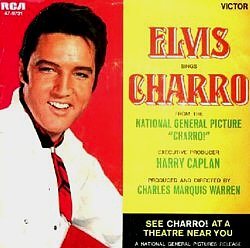 |
The first time I saw Elvis in person I knew he was special. Number one he was the prettiest man you ever saw in your life. He was really beyond handsome. There was something electric about him. Coming along when he did, moving the way he did, jumping around the way he did plus the fact that every woman was totally mesmerized by him. And if they said they weren't they were lying. Everything came to standstill when you saw Elvis. This was when he was 19 and again when he was 30. I saw him at both instances and there was the same reaction both times. You couldn't have wiped the smiles off their faces with a hand grenade. It was unbelievable every time he performed. He was just a great looking guy and he was very confident. He knew what he could do and what he had and he played on it. He came along at a time in the Fifties, him and James Dean, it was the two of them. They were everything.
Note - If you enjoyed this interview with Mac Davis make sure you check out the FTD book 'Writing For The King'. Click here for EIN's in-depth review and purchase details.
Click to comment on this Interview
|
|



